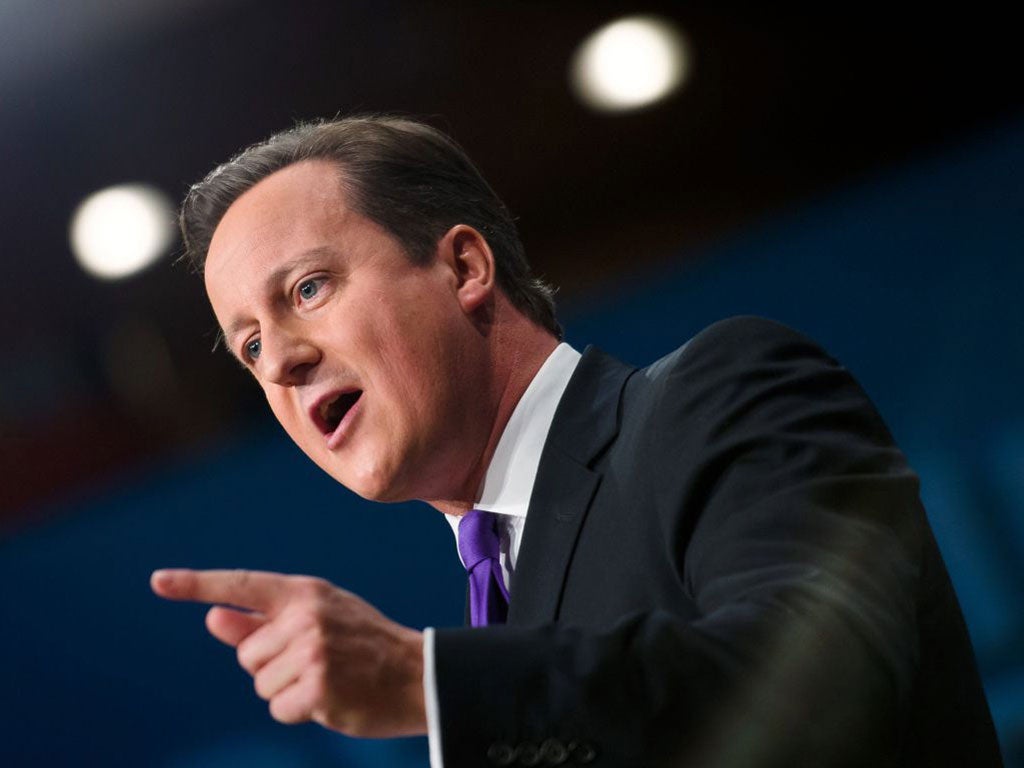David Cameron: 10% pay rise offers MPs opportunity to be more charitable
Prime Minister refuses to block the decision by the expenses watchdog to award MPs with a £7,000 pay rise

Your support helps us to tell the story
From reproductive rights to climate change to Big Tech, The Independent is on the ground when the story is developing. Whether it's investigating the financials of Elon Musk's pro-Trump PAC or producing our latest documentary, 'The A Word', which shines a light on the American women fighting for reproductive rights, we know how important it is to parse out the facts from the messaging.
At such a critical moment in US history, we need reporters on the ground. Your donation allows us to keep sending journalists to speak to both sides of the story.
The Independent is trusted by Americans across the entire political spectrum. And unlike many other quality news outlets, we choose not to lock Americans out of our reporting and analysis with paywalls. We believe quality journalism should be available to everyone, paid for by those who can afford it.
Your support makes all the difference.David Cameron has said the 10 per cent pay rise awarded to MPs offers them an "opportunity to do more in terms of charitable giving".
He faces a public outcry after the Independent Parliamentary Standards Authority (Ipsa), the expenses watchdog, approved the £7,000 increase from £67,060 to £74,000 a year - just a week after George Osborne imposed a further four years of pay restraint on all other public sector workers.
The Prime Minister has repeatedly opposed the controversial move, arguing that the idea of a pay rise at a time of pay restraint “is simply unacceptable”.
However he has resisted calls to intervene to block the pay hike from going ahead and resigned himself to encouraging MPs to give their increase in pay to charity, but insisted the ultimate decision was up to individuals.
"Personally I think the right thing to do is to be paid the rate for the job and that’s what I will do," he told ITV News. "As many MPs have said it gives you an opportunity to do more in terms of charitable giving and things like that but I think MPs…you’re paid a rate for the job and you should take the rate for the job and it’s done independently.
"I don’t actually think this was the right decision but the bit I’m responsible for, ministers’ pay, cut and frozen.”
Yvette Cooper, the Labour leadership candidate and shadow home secretary, was among those demanding Mr Cameron to block the decision and said she would turn down the £7,000 pay rise or donate it to charity.
Not all MPs were against the pay rise, however. Conservative MP Andrew Bridgen said the House of Commons would be filled with the “mad, the rich and those who can’t do anything else” if MPs’ pay never increased.
Fellow Tory MP and foreign office minister Tobias Ellwood was one of the few MPs who wrote to Ipsa backing its decision. He wrote: “I know I speak for the silent majority (who are not millionaires) to say this increase is well overdue.”
He added that he "never expected to be watching the pennies at my age and yet this is what I now have to do," explaining that he would be earning "far more than I am now," if he was still in the Armed Forces.
The pay rise will be back-dated to May 8 – the day after the general election. But Ipsa backed off from its previous plan to link future rises to the whole of the economy, which could have seen MPs £23,000 better off by 2020.
Instead their wages will increase in line with average earnings in the rest of the public sector, which will be limited to 1 per cent a year until the end of the decade.
Sir Ian Kennedy, Ipsa’s chairman, stressed the 10 per cent hike was a “one-off adjustment” to make up for the fact that the “toxic” issue had been “ducked for decades” and pointed out that changes to MPs’ pensions and expenses made the overall package of reforms cost neutral to the taxpayer.
Join our commenting forum
Join thought-provoking conversations, follow other Independent readers and see their replies
Comments